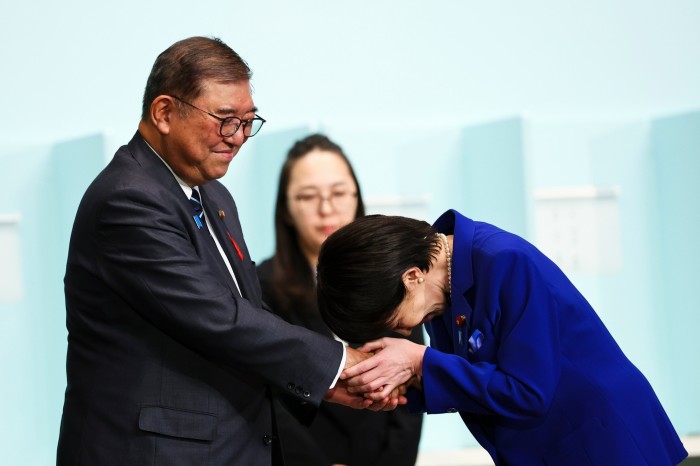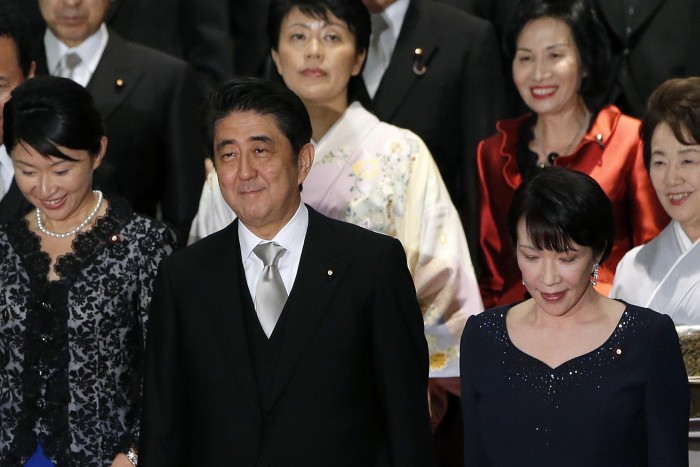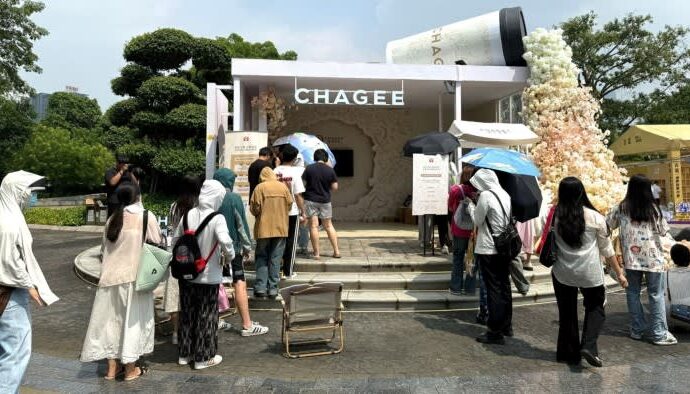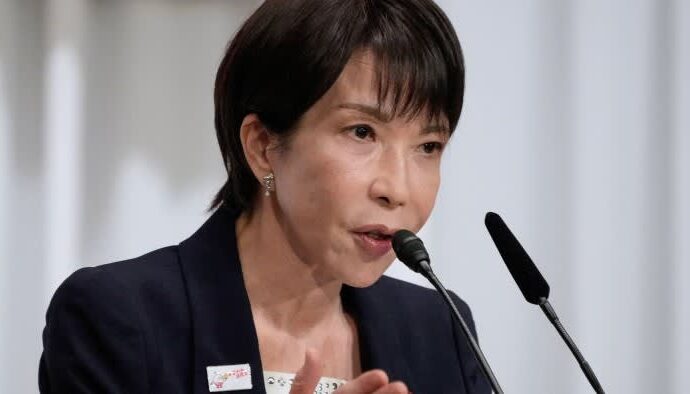Investors are preparing their first “Takaichi trades” as Japan and the wider world adjust to the ascendancy of a pro-stimulus, hardline nationalist as head of the ruling Liberal Democratic party.
Sanae Takaichi’s victory in Saturday’s party leadership race, ahead of a vote that is expected to make her Japan’s first-ever female prime minister later this month, anticipated greater government spending to ease the burden on struggling households and a hawkish foreign policy amid rising geopolitical tensions.
The self-described workaholic inherits a stock market at all-time highs, but also headline inflation that has remained above the central bank’s 2 per cent target for more than three years, and an unpalatable trade deal with the US that will impose levies on Japan’s major export industries and extract $550bn in investment.
Takaichi said on Saturday that she would not renegotiate the tariff deal, having previously suggested she was interested in doing so.
But her premiership is likely to raise a long list of uncertainties, according to financial, political and diplomatic analysts. A return of the “Abenomics” era could further weaken the yen, boost the stock market and cause the yields on long-dated Japanese government bonds (JGBs) to rise sharply, said traders, predicting a volatile week in Tokyo.
“The Takaichi trade is basically positive for stocks, and probably some volatility in JGBs and currency because of the risk of a lot of new fiscal stimulus,” said a senior broker at one of Japan’s largest securities firms.
“I don’t think anyone thinks Takaichi is going to give Japan a ‘Liz Truss’ moment, but things are going to feel quite unsettled for a bit,” they added.
A native of the ancient capital of Nara, a fan of Iron Maiden’s heavy metal music and a devotee of the Hanshin Tigers baseball team, Takaichi, 64, models herself on the UK’s former prime minister Margaret Thatcher, and was a longtime acolyte of the late nationalist prime minister Shinzo Abe.
“Now that the LDP has its first female president, the scenery will change a little,” said Takaichi posing for pictures in the LDP president’s chair shortly after her victory on Saturday.
Her fiery nationalism could strain Japan’s relationships with its regional neighbours, while her support for raising defence spending is likely to antagonise China, analysts warned.
The arch-conservative will also face questions around her ability to reunite and reinvigorate a divided LDP. Her rival in the leadership race Shinjiro Koizumi, a charismatic 44-year-old moderate, was widely expected to act as a more unifying figure.

The party, which has ruled Japan for all but a handful of the past 70 years, lost control of both houses of parliament under outgoing Prime Minister Shigeru Ishiba. More broadly, it has been shedding its conservative base to upstart populist parties such as Sanseito and the Democratic Party for the People — groups which Takaichi is now likely court for support.
The DPP broadly shares Takaichi’s belief in the need for more proactive fiscal spending to drive growth, and was likely to back her in certain types of tax cuts, said political analysts. She could also attempt to woo back hardline conservatives from Sanseito.
But Jeff Kingston, a political scientist at Tokyo’s Temple University, argued that the weak yen, high immigration and rising prices, the very “policies that have eroded LDP support”, were consequences of Abenomics.
“She is the face of a discredited status quo, so the LDP will be burdened with toxic legacies of Abenomics,” said Kingston.
Tobias Harris, founder of Japan Foresight, warned that Takaichi’s hardline conservatism would also grate with the LDP’s longtime junior coalition partner, Komeito, whose membership of the bloc would now come into question. This would force Takaichi’s LDP to rely on temporary deals with opposition parties to pass legislation and budgets — a time-consuming and unpredictably policy process.
If Takaichi struggles to manage the minority government, she could “be tempted to play the snap election card”, Harris said.

Traders said that markets would be adjusting to the idea that Japan’s first “Iron Lady” leader may seek to address the challenges facing Japanese households with government stimulus, tax cuts and pressure on the Bank of Japan to maintain an easy monetary policy.
“From an investor’s standpoint, if policies implying heavier JGB issuance arrive without a safety net, bonds could face selling pressure,” said Shoki Omori, Mizuho’s chief desk strategist, adding that while additional super‑long dated JGB issuance appeared unlikely, some investors anticipated a return to substantial debt issuance.
While observers noted that Takaichi had toned down many of her policy stances since her unsuccessful 2024 bid for the party leadership, her assertion that the BoJ was “stupid” for raising interest rates has already caused some analysts to change their forecasts for an October rate increase.
Abe’s 2013-2020 premiership was marked by frosty relations with South Korea. His visit to the Yasukuni shrine in Tokyo, where Japan’s war dead, including some war criminals, are memorialised, triggered mass anti-Japanese demonstrations across China.
Takaichi has also expressed an intention to visit the shrine as leader, but softened those comments during the campaign.
Her longevity — and Japan’s geopolitical standing — will hinge in part on moderating her past wartime revisionism and China’s hawkishness, warned Stephen Nagy, professor of politics and international studies at the International Christian University of Tokyo.
If she takes too strong a line on defence of Taiwan, he said, relations with Beijing could fray quickly, which would hit Japanese businesses hard.
Takaichi’s diplomatic touch will face two early tests. US President Donald Trump’s planned visit to Tokyo in late October, followed closely by the Asia-Pacific Economic Cooperation forum in Seoul, will offer face-to-face meetings with Japan’s closest ally and Chinese leader Xi Jinping.
“It’s a very immediate trial by fire for Takaichi, with the constant question hanging over markets and geopolitics of whether she is pragmatic or more hardline,” said Nagy. “If she is not nuanced on things like visits to Yasukuni, then her problems could spiral pretty quickly.”


